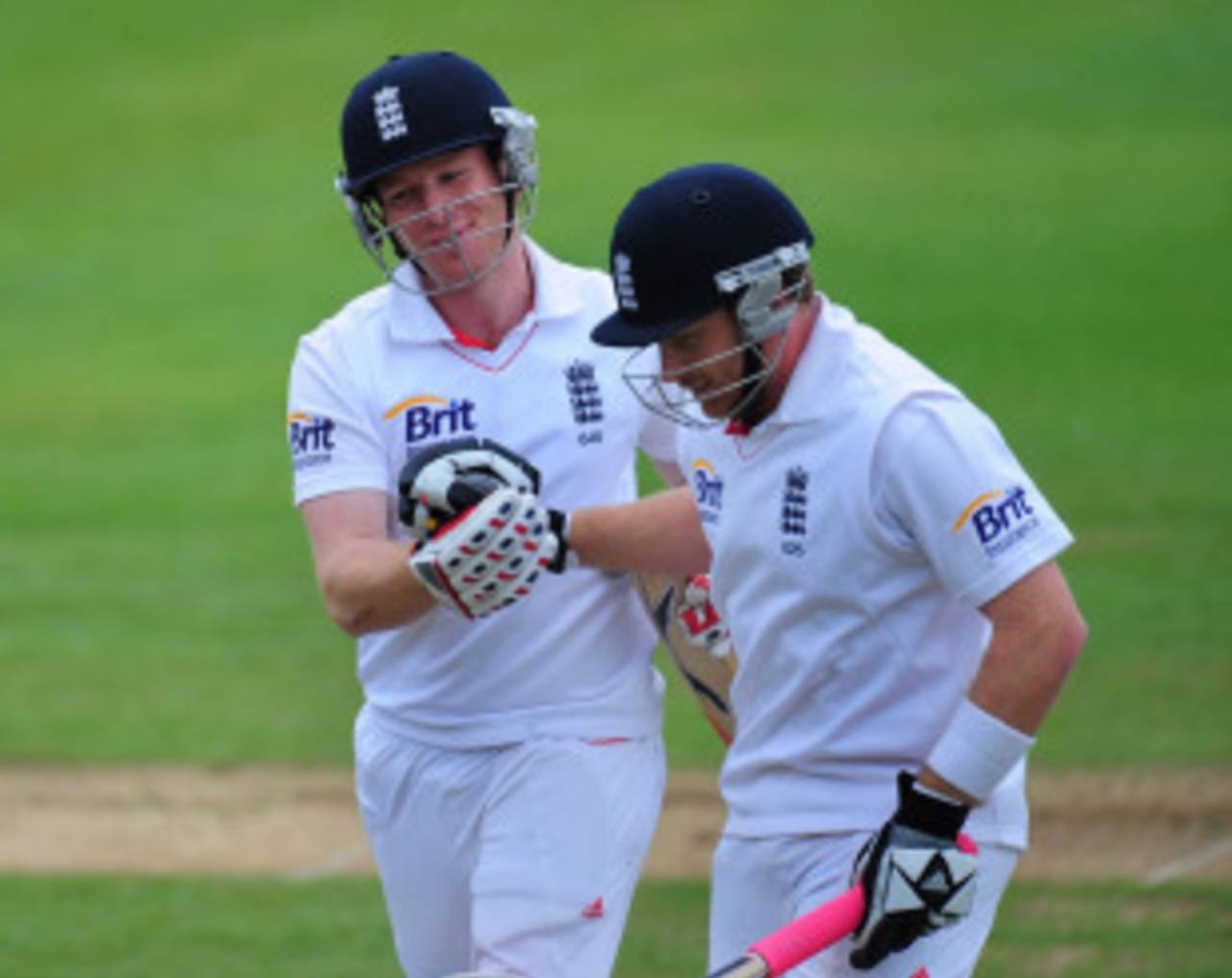An extraordinary Cardiff ending
Before play started on the fifth day at Cardiff, I was thinking what a prosaic Test match it had been
Mike Holmans
25-Feb-2013

Ian Bell deserved his ton, and Andrew Strauss did the right thing by allowing him enough time to get there • Getty Images
Before play started on the fifth day at Cardiff, I was thinking what a prosaic Test match it had been. Until Ian Bell arrived at the crease, we had seen a great deal of very worthy batting from Tharanga Paranavitana, Prasanna Jaywardene and the seemingly unstoppable Alastair Cook and Jonathan Trott, but there had been little to dispel the rainy gloom and lift the spirit.
Bell's 98* on day 4 was a welcome introduction of poetry. Its colour and adventure had the same effect on me as those daffodils when Wordsworth came across them on his walk. Since nothing was likely to happen on the fifth afternoon, I thought it only right and proper that he be given the chance to finish off the hundred before a declaration.
Bell clearly deserved the cachet of a Test century, and it would have stored up untold resentment if Andrew Strauss had denied him the few balls he needed for it. The England squad are genuine fans of each other and would all have wanted him to get it.
For a captain to declare with a batsman on 98*, there had better be a damn good tactical reason for it. Even though Michael Atherton later admitted he got it wrong, his declaration when Graeme Hick was on 98* at Sydney in 1995 was made with the intention of having two bites with the new ball before and after tea; it had a tactical logic to it, and one could easily argue that it was designed to give the team the best possible chance of winning a match which was there for the taking. Had Darren Gough and Devon Malcolm been only half as effective as they had been in Australia's first innings, England would have gone on to win and Hick might have been able to forgive the captain.
That did not apply in Cardiff. It's all very well saying that England would have a better chance of winning if they had 53 overs of play rather than 50, but no one in their right mind would have thought there was better than a one in seven chance of knocking Sri Lanka over with enough time left to get any runs required, especially with a three-man attack on a wicket which they had found pretty easy to bat on. It would take something utterly extraordinary to pull off a win, and three overs was not going to make any real difference to that. And if both batsmen are in on the plan, it's pretty difficult to stop one of them getting two runs in three overs.
So I approved of Strauss's decision, clapped at the TV when Bell's hundred came up and the batsmen came back in, and began to write about Wordsworth and Trott and Jayawardene (P) so that I would have something ready to fire off when the match was over. I assumed Sri Lanka would make about 140-3 and there would be handshakes almost as soon as the last hour was called, and I could talk of moral victories and who would be taking most heart from the game.
The first couple of wickets made little impression on me. It's not at all unusual for the new ball to take out the openers, and I knew the likes of Mahela Jayawardene and Kumar Sangakarra were old enough hands to know how to play out time.
Then Mahela fell. Suddenly I realised the win was on, and didn't even bother to save what I had written because I felt that something else was going to be necessary. When Sangakarra edged Graeme Swann to slip, it was no longer just on: it had become a question of when rather than if, for Sri Lanka have no Paul Collingwood or Shivnarine Chanderpaul unless it's Thilan Samaraweera, and he had already departed for the single-figure score (0 being a single figure) which is his habit in England.
If a tail is going to hang around to save a match, it needs inspiration, and that can only come from a senior player who coolly calms things down and shows that he isn't going to be moved. Without his example, feeble collapse is inevitable once the fielding side smell blood and go on the charge.
I know how Sri Lanka fans must be feeling today. Shell-shocked, stunned, and wondering when they are going to wake up from this dreadful nightmare which surely cannot be real. I remember it oh so well from the time England were routed for 46 by Curtly Ambrose at Port of Spain. Black despair. Shame. Wondering how your friends who don't like cricket are going to mock you when you see them.
Thing is, though, that in the next Test England stormed fortress Bridgetown, inflicting a first defeat on West Indies at the Kensington Oval in 60 years. As we have just seen at Cardiff, anything can and does happen in Test cricket.